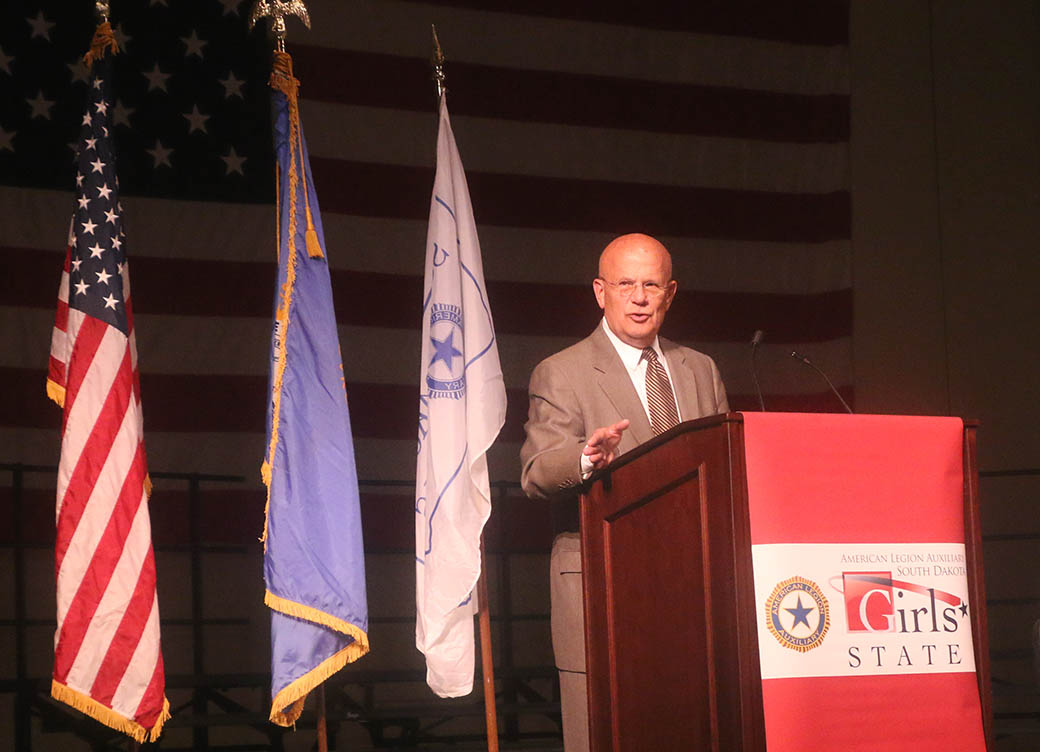
Kennedy targets education in Wednesday speech
By Mollie Schmidt
Mike Stevens and Craig Kennedy took center stage Wednesday talking about separate political parties and their political views they while encouraging Girls State delegates to try their best and get as involved as possible.
Kennedy’s centered his message on post-secondary education in South Dakota.
The morning assembly took place in Aalfs Auditorium Slagle Hall, where stressed the importance of education and said communities could be doing more for the education.
But he isn’t sure money is the only answer to that problem.
“I think we need to be focusing our efforts on trying to create a model that will advance South Dakota’s system, and we need to be looking at how education is done other places, not just around the country, but around the world,” Kennedy said.
Kennedy agrees that some of the budgeting may be things the system may need to involve like a philosophic change and saying it needs to evaluate the education in the view of the world to a higher priority than it currently has.
According to the smart student guide for financial aid website, in some states around the U.S. like Kansas, New York, Kentucky, Missouri, Pennsylvania, Maine and California, there are some secondary-colleges that offer a free tuition. Although students have to pay for room and board, textbooks, and food in the free tuition, these colleges are more affordable for most students who choose to attend.
“I would be surprised if South Dakota would go that far,” Kennedy said.
For Miami delegate Citori Rentz, Kennedy’s speech helped her understand some of the problems within the education system.
“The speech was very informative,” she said.
Rentz added that she doesn’t like the Common Core State Standard Initiative and feels that, too, is a big problem within the student body for many schools due to academic levels and learning objectives changing over the years.
Kennedy also discussed changes within secondary schools to focus on the student they try to attract to the teaching profession.
“They raise standards on admission and graduation requirements, but in exchange, when they come out, they are treated as professionals — much like lawyers, doctors, and engineers. So they are paid and treated more like a professional in the work place,” Kennedy said. “That might be easier than trying to figure out ways to come up with the money to subsidize tuition.”
Kennedy said the relationship between education and politics plays a significant role in education in South Dakota.
“Virtually all the funding of education comes from public sources, whether it is a local school district or whether it is the state of South Dakota with the equalizing payments,” Kennedy said. “It is all political, because the money is all generated through some form of taxes and assessments and are either enacted by representative bodies or voted on by the public.”
He added that the public could be just as political as those in a political office.
Kennedy also addressed gender barriers during his visit to Girls State. He said he doesn’t think the old barriers women faced exist as much, if at all anymore, when trying to get a job in politics.
According to Representation 2020, in 1999, 14 percent of South Dakota legislature members were women. In 2007, it raised two percentages to 16 percent, and in 2013 it rose to just 22 percent.
“I think women can do anything they want to do,” Kennedy said.
